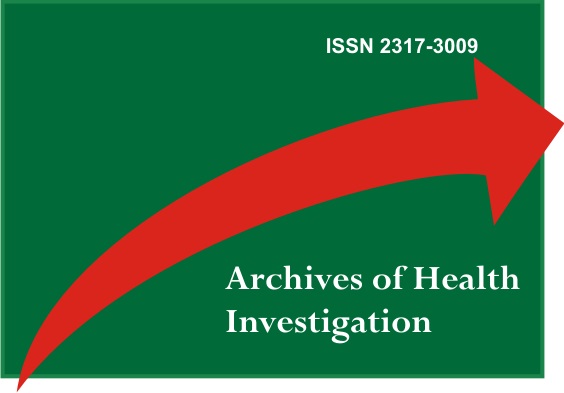Evaluation the Elderly’s Knowledge about HIV / AIDS
DOI:
https://doi.org/10.21270/archi.v11i1.5521Keywords:
Aged, Sexually Transmitted Diseases, EpidemiologyAbstract
This is a cross-sectional study with 61 elderly people who attend a leisure promotion association linked to a public agency in a city in the state of São Paulo, whose objective was to evaluate the elderly's knowledge about HIV / AIDS. Data were collected through a questionnaire administered by a single researcher. Among the investigated, 64% were female; the predominant age group (50.8%) between 60 and 69 years and 55.7% were not living with their partner. Of the total, 56% had an active sex life, but 73.5% said they did not use condoms during sexual intercourse. Higher sexual activity was observed for males (81.8%) and among participants who lived with their partners (92.6%). Not using condoms was associated with female gender (93.8%) and living with a partner (88%). As for HIV transmission, there is still a portion that believes kiss on the mouth (34%); sharing glasses and cutlery (18%); use of the same toilet (25%) and mosquito bites (30%) are means of disease transmission. The results showed gaps in the knowledge of the elderly about the way of transmission and prevention of HIV, which refers to vulnerability and challenges public health, being necessary to think about policies for the creation or reformulation of health actions for the elderly, aiming, in addition to filling these gaps, contributing to behavior change and adopting safe sexual practice.
Downloads
References
Antunes MCP, Moreira MC. Educação intergeracional e envelhecimento bem-sucedido. RBCEH. 2018;15(1):21-32.
IBGE. Instituto Brasileiro de Geografia e Estatística. Projeção da população do Brasil por sexo e idade 2010-2060: Re¬visão 2008. Disponível em: <https://www.ibge.gov.br/estatisticas/sociais/populacao/9109-projecao-da-populacao> Acesso em 12 abr. 2021.
Brasil. Ministério da Saúde. Secretaria de Atenção à Saúde. Departamento de Ações Programáticas e Estratégicas. Atenção à saúde da pessoa idosa e envelhecimento. Brasília: 2010. https://bvsms.saude.gov.br/bvs/publicacoes/atencao_saude_pessoa_idosa_envelhecimento_v12.pdf
Batista AFDO, Marques APDO, Leal MCC, Marino JG, Melo HMDA. Idosos: associação entre o conhecimento da aids, atividade sexual e condições sociodemográficas. Rev Bras Geriatr Gerontol. 2011;14(1):39-48.
Rodrigues LR, Portilho P, Tieppo A, Chambo A. Análise do comportamento sexual de idosas atendidas em um ambulatório de ginecologia. Rev Bras Geriatr Gerontol. 2018;21(6):724-30.
Laroque MF, Affeldt ÂB, Cardoso DH, Souza GLD, Santana MDG, Lange C. Sexualidade do idoso: comportamento para a prevenção de DST/AIDS. Rev Gaúch Enferm. 2011;32: 774-80.
Bienko M. Promotion of sexual health among seniors in the self-help media realm of popular culture. Anthropological Review. 2015;78(3): 251-57.
Oliveira MLC, Paz LC, Melo GF. Ten years of HIV-AIDS epidemic in more than 60 years in Federal District – Brazil. Rev Bras Epidemiol. 2013;16(1):30-9.
Dornelas Neto J, Nakamura AS, Cortez LE, Yamaguchi MU. Doenças sexualmente transmissíveis em idosos: uma revisão sistemática [Sexually transmitted diseases among the elderly: a systematic review]. Cien Saude Colet. 2015;20(12):3853-64.
Nascimento RG, Monteiro EL, Ferreira LS, Santos ZL. Nível de conhecimento de idosos comunitários em relação ao HIV/Aids: estudo exploratório na rede básica de saúde de Belém, Pará, Brasil. RBCEH. 2013;10(1):113-22.
Freitas CASL, da Silva MJ, Brito MDCC, Braga VAB, Bessa MEP. Health policies for the elderly and their families: na integrative literature review. Rev enferm UFPE on line.. 2011;5(9):2300-8.
Garcia GS, Lima LF, Silva JB, Andrade LD, Abrão FMS. Vulnerabilidade dos idosos frente ao HIV/aids: tendências da produção científica atual no Brasil. J Bras Doenças Sex Transm. 2012; 24(3):183-8.
Bittencourt GKGD, Kamylla F, Meira LCS, Santos MCF, SILVA A. Concepções de idosos sobre vulnerabilidades ao HIV/AIDS. Riase online. 2016;2(1):407-20.
De Brito NMI, da Costa Andrade SS, da Silva FMC, Fernandes MRCC, Brito KKG, dos Santos Oliveira SH. Elderly, sexually tranmistted infections and aids: Knowledge and risk perception. ABCS Health Sciences. 2016;41(3):140-45.
Haesler E, Bauer M, Fetherstonhaugh D. Sexuality, sexual health and older people: a systematic review of research on the knowledge and attitudes of health professionals. Nurse Educ Today. 2016;40: 57-71.
Santos A, Assis M. Vulnerabilidade das idosas ao HIV/AIDS: despertar das políticas públicas e profissionais de saúde no contexto da atenção integral: revisão de literatura. Rev Bras Geriatr Gerontol.2011;14(1):147-57.
Brasil. Ministério da Saúde. Boletim epidemiológico: aids e DST. Brasília, ano V, n.1, 2017. http://www.aids.gov.br/pt-br/centrais-de-conteudos/boletins-epidemiologicos-vertical
Cordeiro LI, Lopes TDO, Lira LEDA, Feitoza SMDS, Bessa MEP, Pereira MLD, Feitoza AR, Souza ARD. Validation of educational booklet for HIV/Aids prevention in older adults. Rev Bras Enferm. 2017;70:775-82.
Srinivasan S, Glover J, Tampi RR, Tampi DJ, Sewell DD. Sexuality and the Older Adult. Curr Psychiatry Rep. 2019;21(10):97.
Aguiar RB, Leal MCC, Marques APO. Knowledge and attitudes about sexuality in the elderly with HIV. Cien Saude Colet. 2020;25(6):2051-62.
Nardelli GG, Malaquias BSS, Gaudenci EM, Ledic CS, Azevedo NF, Martins VE, Santos ÁDS. Knowledge about the human immunodeficiency syndrome among elders in a unit for the care of the elderly. Rev Gaúch Enferm. 2017;37(spe):e2016-0039.
Bastos LM, Tolentino JMS, Frota MADO, Tomaz WC, Fialho MLDS, Batista ACB et al. Avaliação do nível de conhecimento em relação à Aids e sífilis por idosos do interior cearense, Brasil. Ciênc Saúde Colet. 2018;23:2495-502.
Lazzarotto AR, Santos VSD, Reichert MT, Quevedo DMD, Fossatti P, Santos GAD, Calvetti PU, Sprinz, E. Oficinas educativas sobre HIV/Aids: uma proposta de intervenção para idosos. Rev Bras Geriatr Gerontol. 2013;16:833-43.
Araújo SL, Zazula R. Sexualidade na terceira idade e terapia comportamental: revisão integrativa. RBCEH. 2015;12(2):172-82.
Silva CM, Lopes FMVM, Vargens OMC. A vulnerabili¬dade da mulher idosa em relação à AIDS. Rev Gaúch Enferm. 2010;31(3):450-57.
Andrade J, Ayres JA, Alencar RA, Duarte MTC, Parada CMGDL. Vulnerability of the elderly to sexually transmitted infections. Acta Paul Enferm. 2017;30(1):8-15.
Iqbal MM. Can we get AIDS from mosquito bites? J LA State Med Soc. 1999;151(8): 429-33.
UNAIDS. 90-90-90 An ambitious treatment target to help end the AIDS epidemic. Disponível em: <http://www.unaids.org/en/resources/documents/> Acesso em 20 mai. 2021.


